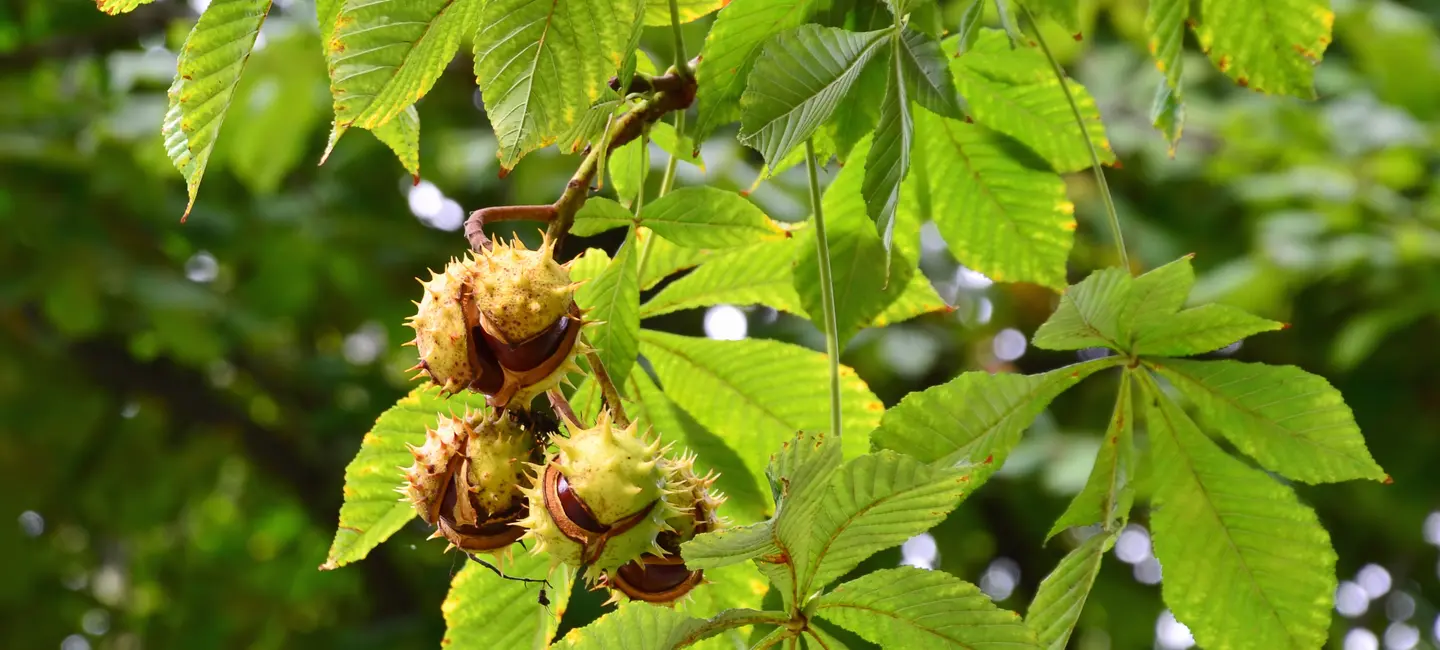
Horse chestnut (Aesculus hippocastanum) is a tree. Horse chestnut contains significant amounts of a poison called esculin and can cause death if eaten raw.
Horse chestnut also contains a substance that thins the blood. It makes it harder for fluid to leak out of veins and capillaries, which can help prevent water retention (edema). The horse chestnut fruits contain seeds that look like the sweet chestnut but have a bitter taste.
People most commonly take horse chestnut seed extracts by mouth to treat poor circulation that can cause the legs to swell (chronic venous insufficiency or CVI). It's also used for many other conditions, but there is no good scientific evidence to support these other uses.
Be careful not to confuse Aesculus hippocastanum (Horse chestnut) with Aesculus californica (California buckeye) or Aesculus glabra (Ohio buckeye). Some people call any of these plants horse chestnut, but they are different plants with different effects.
Is It Effective?
NatMed Pro rates effectiveness based on scientific evidence according to the following scale: Effective, Likely Effective, Possibly Effective, Possibly Ineffective, Likely Ineffective, Ineffective, and Insufficient Evidence to Rate.
- Poor circulation that can cause the legs to swell (chronic venous insufficiency or CVI). Taking 300 mg of standardized horse chestnut seed extract by mouth can reduce some symptoms of poor blood circulation, such as varicose veins, pain, tiredness, swelling in the legs, itching, and water retention. But it might be less effective than maritime pine bark for reducing leg swelling and cramps.
There is interest in using horse chestnut for a number of other purposes, but there isn't enough reliable information to say whether it might be helpful.
Is it Safe?
When taken by mouth: Standardized horse chestnut seed extract products are likely safe for most people when used short-term. Only use products which have had esculin, a toxic substance, removed. Horse chestnut products can sometimes cause side effects such as dizziness, headache, stomach upset, and itching.
Raw horse chestnut seed, bark, flower, and leaf contain esculin and are unsafe to use. Signs of esculin poisoning include stomach upset, muscle twitching, weakness, vomiting, diarrhea, depression, and paralysis. Seek immediate medical attention if you've accidentally consumed raw horse chestnut.
When applied to the skin: There isn't enough reliable information to know if horse chestnut is safe. Some people are allergic to horse chestnut.
Special Precautions & Warnings:
Pregnancy and breast-feeding: Taking the raw seed, bark, flower, or leaf is unsafe and can lead to death. There isn't enough reliable information to know if horse chestnut seed extract products are safe during pregnancy and breast-feeding, even if they have had the poisonous chemical esculin removed. Stay on the safe side and avoid use.
Children: The raw horse chestnut seed, bark, flower, and leaf are unsafe and can even cause death. Children have been poisoned by drinking a tea made from the leaves and twigs, or from eating the seeds.
Bleeding disorders: Horse chestnut might slow blood clotting. Taking horse chestnut might increase the risk of bruising and bleeding in people with bleeding disorders.
Digestion problems: Horse chestnut seeds and bark can irritate the stomach. Don't use it if you have a bowel or stomach disorder.
Liver disease: There is one report of liver injury associated with using horse chestnut. If you have a liver condition, it is best to avoid horse chestnut.
Latex allergy: People who are allergic to latex might also be allergic to horse chestnut.
Kidney disease: There is a concern that horse chestnut might make kidney disease worse. Do not use it if you have kidney problems.
Surgery: Horse chestnut might slow blood clotting. Horse chestnut might increase the risk of bleeding if used before surgery. People using horse chestnut should stop at least 2 weeks before surgery.
Medications that slow blood clotting (Anticoagulant / Antiplatelet drugs)
Interaction Rating=Moderate Be cautious with this combination.
Horse chestnut might slow blood clotting. Taking horse chestnut along with medications that also slow blood clotting might increase the risk of bruising and bleeding.
Ginkgo: Ginkgo might interfere with the breakdown of horse chestnut. This could increase the effects and side effects of horse chestnut.
Herbs and supplements that might slow blood clotting: Horse chestnut might slow blood clotting and increase the risk of bleeding. Taking it with other supplements with similar effects might increase the risk of bleeding in some people. Examples of supplements with this effect include garlic, ginger, ginkgo, nattokinase, and Panax ginseng.
There are no known interactions with foods.
Horse chestnut extract has most often been used by adults in doses of 300-600 mg by mouth daily for 8-12 weeks. Most horse chestnut extract products contain 16% to 20% triterpene glycosides (saponins), which is referred to as "aescin" on product labels. Only use horse chestnut products which have had esculin, a poisonous chemical, removed. Speak with a healthcare provider to find out what dose might be best for a specific condition.
Aescin, Aescine, Aesculus hippocastanum, Buckeye, Castaño de Indias, Châtaignier de Mer, Châtaignier des Chevaux, Chestnut, Conker Tree, Escine, Faux-Châtaignier, Hippocastani Cortex, Hippocastani Flos, Hippocastani Folium, Hippocastani Semen, Hippocastanum Vulgare Gaertn, Marron Europeen, Marronnier, Marronnier Blanc, Marronnier Commun, Marronnier d'Inde, Marronnier des Chevaux, Pu, Sodium Aescinate, Spanish Chestnut, Venastat, Venostasin Retard, Venostat, White Chestnut.
Information on this website is for informational use only and is not intended to replace professional medical advice, diagnosis, or treatment. While evidence-based, it is not guaranteed to be error-free and is not intended to meet any particular user’s needs or requirements or to cover all possible uses, safety concerns, interactions, outcomes, or adverse effects. Always check with your doctor or other medical professional before making healthcare decisions (including taking any medication) and do not delay or disregard seeking medical advice or treatment based on any information displayed on this website.
© TRC Healthcare 2024. All rights reserved. Use and/or distribution is permitted only pursuant to a valid license or other permission from TRC Healthcare.
